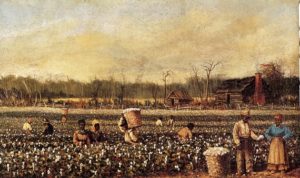
“For a long time we have believed in nothing but the values arising in a
mechanized, commercialized, urbanized way of life: it would be as well
for us to face the permanent conditions upon which God allows us to live
upon this planet.”
~~T.S. Eliot
Our farm was a broadly covered area of green stalks, blanketing
the ground for hundreds of acres all around. In a slow-motion explosion,
day-by-day, week-by-week, the land revealed the white birth of cotton,
the king crop of the Mississippi Delta. There were great vines of
honeysuckle on one side of the house. The aroma seemed more noticeable
in the open country, too. It occupied your nostrils like a natural
perfume; a fragrance of home. Also, large, fifty-year-old sweet gums,
magnolias, and four giant oaks fortified the house and yard, forming a
canopy of shade, from the hot dusty summers. There was no Bermuda grass
or St. Augustine, just yard grass, crab grass, lush and green from the
rich soil. We cut it with mower and sling blade.
The house was apropos to the Mayfields and their lives. But it
was almost home to all of us. And each of us was in many ways like the
other.
The rooms seemed bare, though wallpapered: browned by age and
time and dust and humidity. Various prints of artwork: The Blue Boy; a
ship sailing an unknown sea presenting dark sails against a moonlit
night; a lake in the mountains somewhere, unknown but to the artist. A
clock rested on the mantle in the living room, the hourly chime spilling
throughout the house, somehow more wistful after bedtime.
The ceilings were high, and the furniture was dark mahogany, firm
and sturdy and had a look of dominance. Though it could be scarred, it
would hold its ground when bumped by an elbow, or a toe without a
slipper; though it shared its masculine power with a feminine
gentleness: No drink touched its skin absent a coaster.
The wall along the stairway was festooned with photographs of the
Mayfield tree: great and grand uncles and fathers, many deceased; the
depictions clearly etched, fading with age. One, a former Confederate
soldier, an empty sleeve pinned to his chest.
More @ The Abbeville Institute







